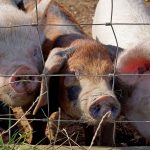Egg shortages “could just be the start” as the UK is “sleepwalking” into a food supply crisis, the union for farmers and growers has warned.
The National Farmers’ Union (NFU) called on the government to step in and assist primary producers under severe strain from soaring fuel, fertiliser and feed costs.
“Shoppers up and down the country have for decades had a guaranteed supply of high-quality affordable food produced to some of the highest animal welfare, environmental and food safety standards in the world,” NFU president Minette Batters told the BBC.
“But British food is under threat… at a time when global volatility is threatening the stability of the world’s food production, food security and energy security.
“I fear the country is sleepwalking into further food supply crises, with the future of British fruit and vegetable supplies in trouble.”
Ms Batters said the threats to the UK’s food supply mean the egg shortages experienced this year “could just be the start”.
Some supermarket giants introduced a temporary buying limit on eggs as a precautionary measure in November amid the impact on supply of rising costs and bird flu.
Soaring cost of baby formula is leading to unsafe feeding practices
Cost of living: First easing of grocery inflation for 21 months but Christmas dinner costs surge 9%
Two in five independent theatres fear they could close permanently as Christmas ticket sales drop
Read more:
Milk, cheese and egg costs rise at fastest pace in 45 years
Lowest-cost groceries have become 17% more expensive
Ahead of an emergency press conference today, the NFU said tomatoes, cucumbers and pears could be among the next food items likely impacted by supply problems because they all come from energy-intensive crops.
However, the Department for Environment, Food and Rural Affairs (Defra) said Britain has a high degree of food security which is “built on supply from diverse sources”, including strong domestic production as well as imports through stable trade routes.
The rate of food price inflation is expected to reach a peak year-on-year of between 17% and 19% in early 2023, according to the Institute of Grocery Distribution (IGD).
It was up from its previous forecast of a peak between 14% and 16%.






















